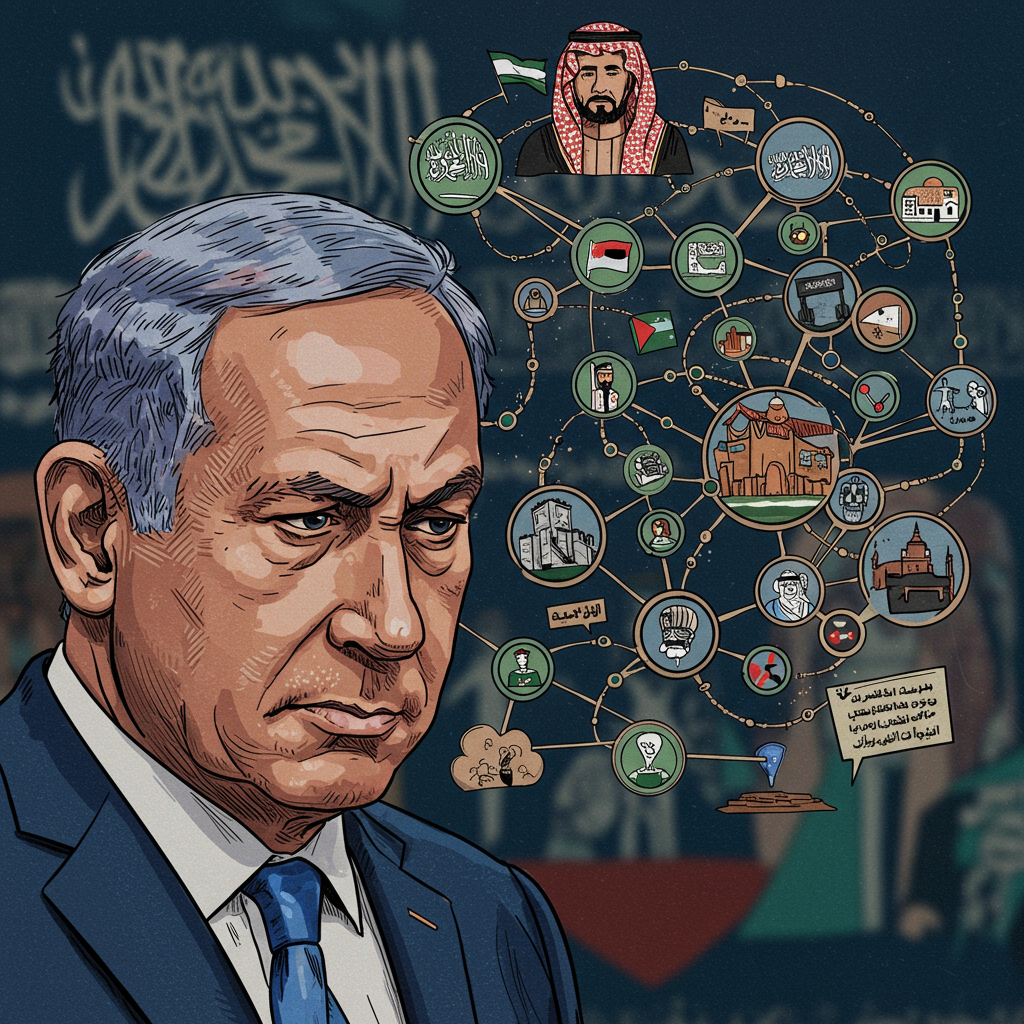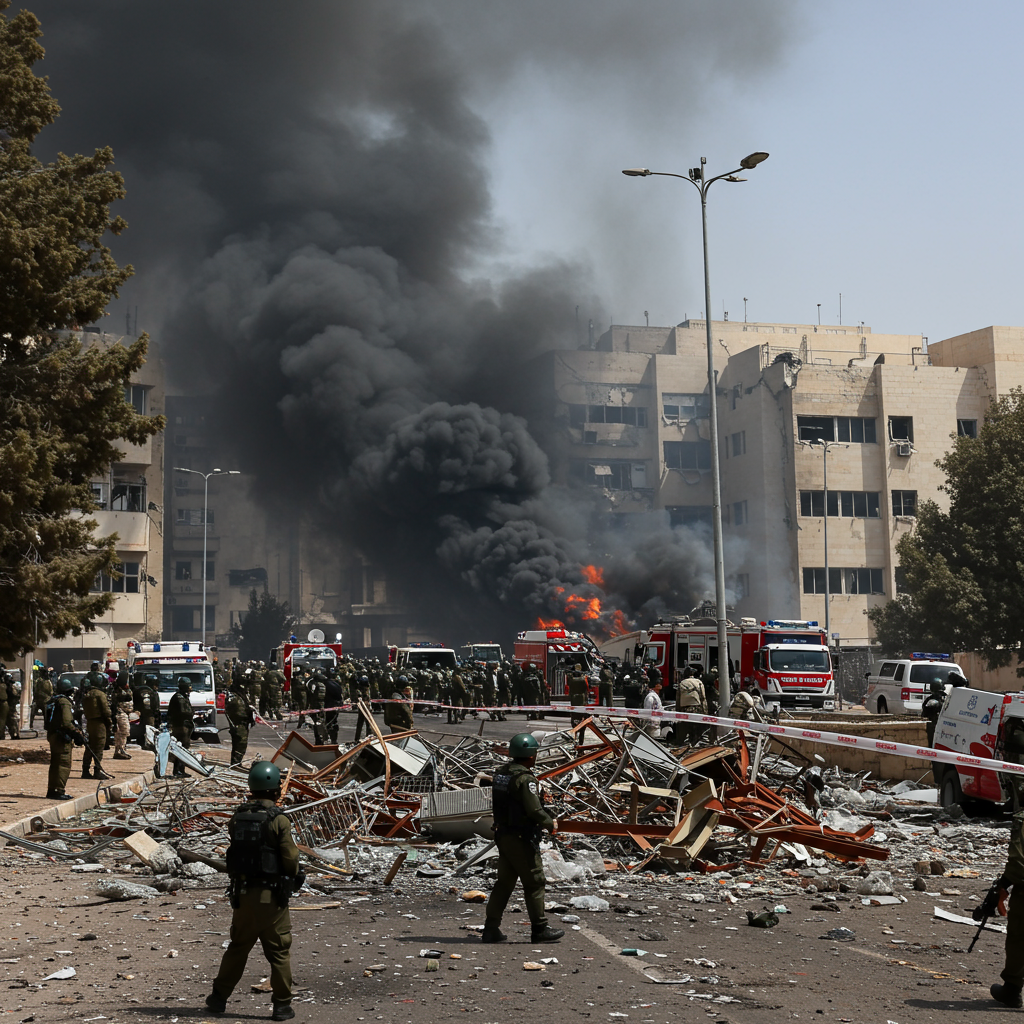Achieving a historic normalization agreement between israel and saudi Arabia hinges on complex conditions. While progress on a Gaza ceasefire might seem like a crucial step, Saudi Arabia’s non-negotiable demands pose significant hurdles for Israeli Prime Minister Benjamin Netanyahu. These conditions, particularly the requirement for a clear path toward palestinian statehood, conflict sharply with Netanyahu’s political stance and his coalition’s priorities, potentially stalling a deal even if a truce with Hamas is reached.
This intricate diplomatic landscape involves multiple players and competing interests. The Trump administration has been actively involved, with envoys like Steve Witkoff proposing cease-fire plans for Gaza. However, even if such a plan gains traction with groups like Hamas, the broader regional strategy, including expanded Abraham Accords to include Riyadh, faces its most formidable challenge from Saudi prerequisites. For Saudi Crown Prince Mohammed bin Salman (MBS), securing a commitment to Palestinian statehood is a central component, a demand deeply problematic for Netanyahu’s current government.
The Gaza Ceasefire: A Necessary, But Not Sufficient, Step
Recent diplomatic efforts have intensified around achieving a ceasefire in the Gaza Strip. Former President Donald Trump’s special envoy, Steve Witkoff, and others have reportedly championed a phased framework aimed at ending the conflict. US officials have expressed guarded optimism that Hamas might eventually accept a version of this plan.
This proposed “Witkoff framework” is generally understood as a multi-phase process. The initial phase would involve a temporary cessation of hostilities, potentially lasting around 40 days. This period would focus on intensive negotiations and the release of a specific number of Israeli hostages. A second phase would then aim for a more permanent end to the fighting and the release of remaining live captives.
However, reaching this initial agreement faces significant obstacles. Israel maintains firm conditions, insisting that any ceasefire must ultimately lead to the disarmament of Hamas and the exile of its leadership. Israeli officials are reportedly wary of reports suggesting US envoys might have engaged in communication with Hamas without Israel’s direct involvement, breaking previous precedents. Despite these reservations, Israel has sent high-level delegations to negotiation sites, indicating a willingness to explore terms under pressure.
Hamas, on the other hand, views the US as the primary entity capable of stopping Israel’s military actions. They have linked hostage releases, such as that of American-Israeli Edan Alexander, to expectations of US pressure for a permanent ceasefire, comprehensive negotiations, and humanitarian aid. Hamas rejects demands for total demilitarization, viewing it as a “million red lines,” and insists that any deal must include a clear path toward a full Israeli withdrawal and an end to the occupation of Gaza. This fundamental disagreement over the final status of Gaza and Hamas’s future poses a major hurdle for the ceasefire itself, let alone its role in a broader normalization deal.
Saudi Arabia’s Demands Go Beyond Gaza
While ending the conflict in Gaza is a stated interest for Saudi Arabia due to regional stability concerns and public sentiment, the price tag for full normalization with Israel is far more extensive. MBS and his advisors have consistently outlined core conditions that form the bedrock of their demands for expanding the Abraham Accords. These requirements are not mere talking points; they are considered essential for the Kingdom to undertake such a politically significant step.
Key Saudi conditions include:
Unambiguous Commitment to Palestinian Statehood: This is perhaps the most significant and challenging demand for Netanyahu. Saudi Arabia requires a credible, irreversible pathway towards the creation of a Palestinian state in the West Bank and Gaza, with clear timelines or specific steps. This contrasts sharply with Netanyahu’s long-held public opposition to a sovereign Palestinian state.
Gaza Reconstruction and Governance: Following a ceasefire, Saudi Arabia expects significant efforts towards the reconstruction of Gaza. Furthermore, there must be a plan for legitimate governance, potentially involving a reformed Palestinian Authority taking a role, effectively sidelining Hamas.
Holding Regional Ceasefires: Beyond Gaza, the Saudis are likely to push for stability on Israel’s other borders. This includes ensuring a ceasefire holds in Lebanon, preventing Hezbollah from returning to positions near the Israeli border and allowing displaced Israelis to return home.
Potential Golan Heights Adjustments: There is an expectation that Saudi Arabia might advocate for Israel to relinquish positions in the Syrian Golan Heights. This move would aim to support regional stability efforts, particularly assisting the post-Assad leadership in Damascus and guarding against cross-border threats.
Robust US Security Guarantees: A core component of the potential trilateral deal is a set of bilateral US-Saudi agreements. The primary prize for Riyadh is a strong security treaty with the United States, designed to deter Iranian aggression and solidify US commitment to Saudi defense.
Civil Nuclear Cooperation: Saudi Arabia seeks US support for a civil nuclear program, including uranium enrichment on Saudi soil, a point of significant concern for Israel and some in the US.
Alignment with the US: The US requires solid commitments from Saudi Arabia to favor the United States over increasing Chinese influence, particularly in critical technological and strategic areas.
These demands paint a picture of a comprehensive regional realignment that requires significant concessions from all parties, particularly Israel.
Netanyahu’s Domestic Tightrope Walk
The most immediate roadblock for Netanyahu in meeting Saudi demands, particularly on Palestinian statehood, is his own government coalition. His reliance on far-right partners like Itamar Ben Gvir and Bezalel Smotrich, who are staunchly opposed to any form of Palestinian statehood and advocate for increased settlement activity, makes any concession on this front politically perilous. Agreeing to a credible pathway for a Palestinian state could easily lead to the collapse of his government, triggering snap elections.
While public polls in Israel have shown support for a hostage deal, potentially even if it means the departure of hardline ministers, campaigning on a platform that includes concessions toward Palestinian statehood would be challenging for Netanyahu, especially in the wake of the October 7th attacks, which have heightened Israeli security fears. However, proponents of the deal suggest that Netanyahu could potentially campaign on achievements like returning hostages, securing significant US backing, and demonstrating strength against Iran, potentially allowing him to form a future coalition less dependent on the far-right. This scenario, however, would introduce significant delays due to the election process itself.
Furthermore, Israeli trauma from the October 7th attacks fuels deep-seated fears about the security implications of any Palestinian entity, raising the bar for acceptable security guarantees should a statehood pathway be considered. Finding a formula for “Palestinian statehood” that is acceptable to MBS, potentially involves a reformed Palestinian Authority governing Gaza, and provides sufficient, credible security guarantees for Israel is an incredibly complex negotiation.
Trump’s Independent Path Adds Complexity
The Trump administration’s involvement introduces another layer of unpredictability. While Trump has historically demonstrated strong, often unconditional, public support for Israel (moving the embassy, recognizing Golan Heights, Abraham Accords), his second term approach appears more transactional and less aligned with traditional US-Israel coordination on regional diplomacy. Reports indicate direct US negotiations with Hamas and Iran without fully informing or coordinating with Israel, a significant departure from past practice.
This shift suggests that while Trump may give Israel a “green light” on operations in Gaza, he is less inclined to align broader US regional strategy with Israeli interests. His focus appears to be on securing major bilateral deals with Gulf states, including the lucrative arms sales and potential civil nuclear cooperation sought by Saudi Arabia. This transactional approach means that securing the US-Saudi bilateral agreements needed to underpin normalization, potentially involving significant financial pledges from MBS, could take precedence.
However, the required US Senate ratification for a US-Saudi security treaty necessitates bipartisan support, potentially complicating Trump’s strategy depending on the political climate and his domestic agenda. The evolving dynamics in the Middle East, where Gulf allies are increasingly pursuing detente with Iran and seeking stability for business interests, also influence Trump’s approach, sometimes prioritizing regional stability over strict alignment with Israel’s security priorities regarding adversaries like Iran and its proxies.
Hurdles Remain High
Even if a Gaza ceasefire were achieved, the path to Israeli-Saudi normalization is fraught with difficulty. The core contradiction between Saudi Arabia’s demand for a credible path to Palestinian statehood and Netanyahu’s political constraints and stated policies remains the most significant impediment. Adding to this are the complexities of securing robust US security guarantees for Saudi Arabia, navigating sensitive issues like civil nuclear cooperation, ensuring stability on Israel’s northern border, and dealing with the deeply entrenched positions of Hamas and Israel regarding Gaza’s future.
Resolving these issues requires not only diplomatic skill but also navigating volatile domestic politics in both Israel and the United States, alongside the shifting dynamics of the wider Middle East. A realistic assessment suggests that achieving a full normalization deal, incorporating all Saudi demands, will require significant time, strategic patience, and potentially a different political configuration in Israel.
Frequently Asked Questions
What are Saudi Arabia’s main demands for normalizing relations with Israel?
Saudi Arabia has consistently stated several core conditions for normalization. The most prominent is a credible and unambiguous commitment from Israel towards establishing a Palestinian state. Other significant demands include extensive reconstruction efforts in Gaza, ensuring regional ceasefires hold (including in Lebanon), potentially addressing issues in the Syrian Golan Heights, and securing robust bilateral agreements with the United States, particularly a strong defense treaty and civil nuclear cooperation.
How does a Gaza ceasefire plan relate to the potential Israeli-Saudi normalization?
A Gaza ceasefire is seen by many as a necessary prerequisite for normalization, as continued conflict undermines regional stability and public acceptance. US envoys have worked on phased ceasefire plans involving hostage releases and negotiation towards ending hostilities. However, achieving a ceasefire, even if Hamas agrees, is not sufficient* on its own to unlock normalization. Saudi Arabia’s demands, especially the commitment to Palestinian statehood, extend far beyond the immediate conflict in Gaza and represent the larger, more challenging hurdles for Israel.
What are the key political hurdles Netanyahu faces regarding a potential Saudi deal?
Prime Minister Netanyahu’s primary domestic political hurdle is his dependence on far-right coalition partners who staunchly oppose Palestinian statehood and any significant concessions on territory or sovereignty. Accepting Saudi demands for a pathway to a Palestinian state could lead to the departure of these partners, potentially collapsing his government and forcing snap elections. Furthermore, security concerns post-October 7th make any discussion of Palestinian governance and security arrangements highly sensitive within Israel.
Word Count Check: 1230



